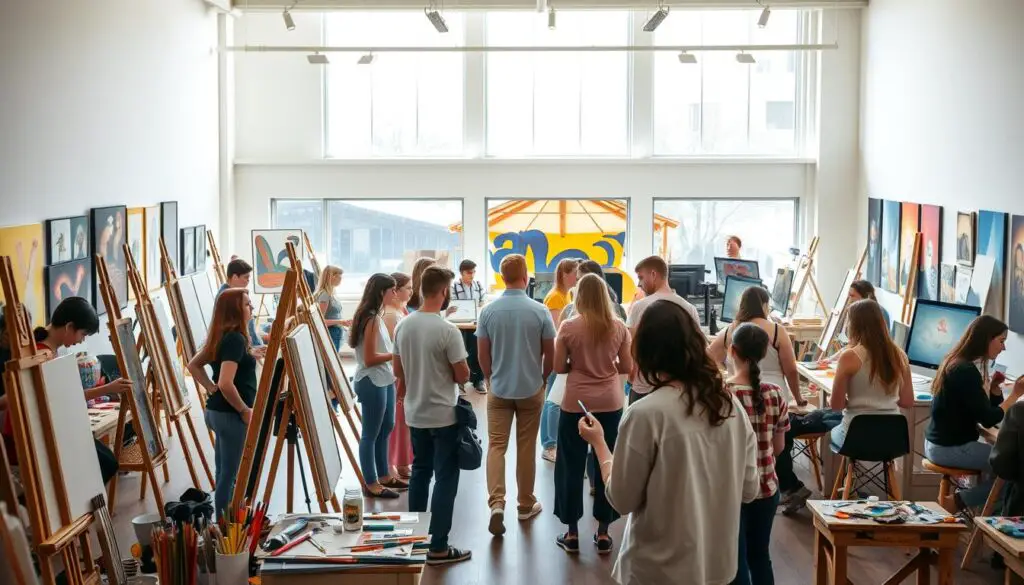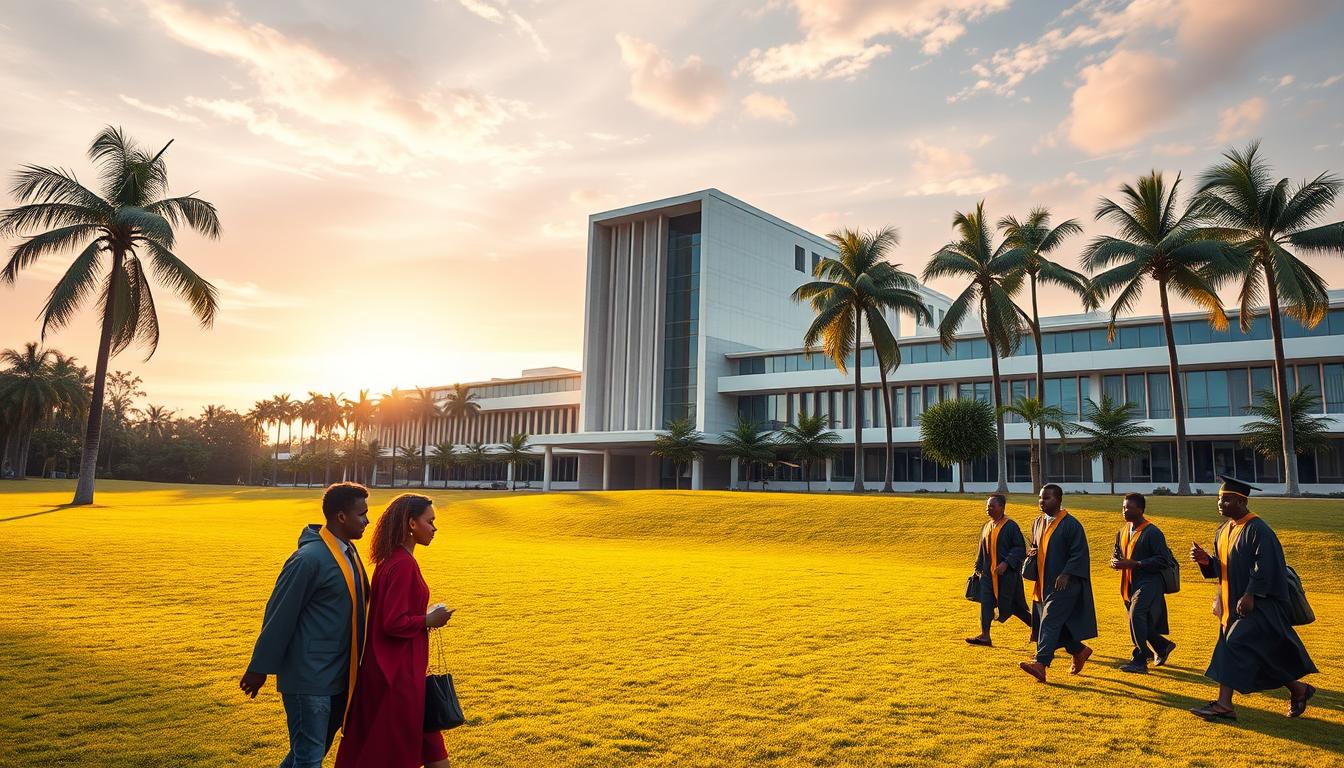The Top Art Courses for Aspiring Art students in Nigeria
Nigeria’s vibrant art scene is a testament to the country’s rich cultural heritage. For aspiring artists, choosing the right art education is crucial for honing their skills and achieving success.
The quality of art education in Nigeria varies across institutions, making it essential for students to research and select the best programs that align with their career goals.
This article will provide an overview of the top art schools in Nigeria, highlighting their unique strengths and offerings.
Key Takeaways
- Overview of top art schools in Nigeria
- Importance of choosing the right art education
- Key features to consider when selecting an art program
- Career opportunities for art graduates in Nigeria
- Insights into the Nigerian art scene
Understanding the Art Education Landscape in Nigeria
Art education in Nigeria has a rich history that has shaped its current institutions and practices. The country’s art education sector has evolved significantly, influenced by various cultural, social, and economic factors.
The Evolution of Art Education in Nigeria
The evolution of art education in Nigeria can be traced back to the traditional art forms that were prevalent in various parts of the country. With the advent of colonialism, Western-style art education was introduced, leading to a blend of traditional and modern art practices. Today, Nigerian art education encompasses a wide range of disciplines, from fine arts to industrial design.
Key milestones in this evolution include:
- The establishment of the first art schools and institutions
- The introduction of new art forms and techniques
- The incorporation of traditional Nigerian art into modern curricula
Types of Art Institutions Available
Nigeria is home to a diverse range of art institutions, catering to different needs and aspirations. These include:
| Institution Type | Description | Examples |
|---|---|---|
| Universities | Offer degree programs in various art disciplines | University of Nigeria, Nsukka; University of Lagos |
| Polytechnics | Provide diploma and certificate programs in art and design | Yaba College of Technology; The Federal Polytechnic Auchi |
| Specialized Art Schools | Focus on specific art forms or techniques | Nike Art Centre; Universal Studios of Art |
Accreditation and Recognition Factors
Accreditation is a critical factor in ensuring the quality of art education in Nigeria. Institutions are accredited by relevant bodies such as the National Universities Commission (NUC) and the National Board for Technical Education (NBTE). Accreditation factors include:
- Curriculum relevance and quality
- Faculty qualifications and experience
- Facilities and resources available
By understanding these aspects, prospective students can make informed decisions about their art education.
Assessing Your Artistic Goals and Interests
The path to a fulfilling art career begins with assessing your artistic interests and objectives. Understanding your strengths, passions, and career aspirations is crucial in making informed decisions about your art education. This self-assessment process enables you to choose art courses that align with your goals, thereby enhancing your chances of success in the competitive art world.
Identifying Your Artistic Strengths and Passions
To identify your artistic strengths and passions, start by reflecting on your past experiences and the activities that you enjoy most. Consider the types of art that you are naturally drawn to, such as painting, sculpture, or graphic design. Make a list of your favorite art forms and the skills required for each.
It’s also essential to seek feedback from others, including teachers, mentors, and peers. They can provide valuable insights into your strengths and areas for improvement. You can also experiment with different art forms to discover what you enjoy most and where your talents lie.
Setting Clear Career Objectives
Setting clear career objectives is vital in guiding your art education journey. Determine what you want to achieve in your art career, whether it’s becoming a professional artist, art educator, or designer. Your career objectives should be specific, measurable, achievable, relevant, and time-bound (SMART).
To set effective career objectives, consider factors such as your artistic strengths, market demand, and personal interests. Research the job market and required skills to ensure your objectives are aligned with industry needs.
| Career Objective | Required Skills | Art Courses |
|---|---|---|
| Professional Artist | Painting, drawing, sculpture | Fine Arts, Painting, Sculpture |
| Art Educator | Teaching, art history, curriculum design | Art Education, Art History |
| Graphic Designer | Graphic design software, visual communication | Graphic Design, Visual Arts |
Matching Your Goals with Appropriate Art Courses
Once you have identified your artistic strengths and set clear career objectives, it’s time to match your goals with the right art courses. Research various art programs and institutions that offer courses aligned with your career aspirations.
Consider factors such as curriculum, faculty expertise, facilities, and resources when selecting an art course. Ensure that the course content and structure align with your learning style and career goals. By choosing the right art course, you can acquire the necessary skills and knowledge to succeed in your chosen art career.
The BEST Art Courses in Nigerian Universities
Several Nigerian universities stand out for their exceptional art courses, which are designed to foster creativity and technical proficiency in students. These institutions have a long history of producing talented artists who have made significant contributions to the Nigerian art scene.
Fine Arts Programs at University of Nigeria, Nsukka
The University of Nigeria, Nsukka, is renowned for its Fine Arts programs, which offer students a comprehensive education in various art disciplines. The program focuses on developing technical skills in drawing, painting, and sculpture, while also encouraging creativity and innovation. Students are exposed to a wide range of artistic techniques and mediums, preparing them for careers in the art industry.
Creative Arts at University of Lagos
The University of Lagos offers a Creative Arts program that is designed to equip students with the skills needed to succeed in the creative industry. The program covers a broad spectrum of art forms, including drama, music, and visual arts. Students are encouraged to explore their creative potential and develop their unique artistic voice.
Visual Arts at Ahmadu Bello University
Ahmadu Bello University’s Visual Arts program is highly regarded for its emphasis on both traditional and contemporary art practices. The program provides students with a solid foundation in art history, theory, and practice, preparing them for careers in the art world. Students have the opportunity to engage with various mediums, including painting, sculpture, and printmaking.
Industrial Design at Federal University of Technology, Akure
The Federal University of Technology, Akure, offers an Industrial Design program that focuses on the application of art and design principles to industrial production. The program is designed to equip students with the skills needed to succeed in the manufacturing and design industries. Students learn about product design, ergonomics, and design theory, among other topics.
Art Education at Obafemi Awolowo University
Obafemi Awolowo University’s Art Education program is designed to train students to become art educators, capable of teaching art in various educational settings. The program covers art history, art theory, and studio practice, providing students with a comprehensive understanding of art and its role in education. Graduates are equipped to inspire and educate future generations of artists.
Top Polytechnic Art Programs in Nigeria
For aspiring artists in Nigeria, polytechnics provide a robust platform for honing their skills through various art programs. These institutions are designed to offer practical and vocational training that prepares students for the demands of the art industry.
The polytechnic system in Nigeria is well-established, with many institutions offering a range of art-related courses. These programs are tailored to equip students with the technical skills and creative vision necessary to succeed in their chosen art careers.
Yaba College of Technology’s Art School
Yaba College of Technology is one of the most prestigious polytechnics in Nigeria, with its art school offering a variety of programs that cater to different artistic interests. The college is known for its emphasis on both theoretical knowledge and practical skills, ensuring that graduates are well-rounded artists.
The art programs at Yaba College of Technology include courses in fine arts, graphics, and industrial design, among others. Students are exposed to a stimulating environment that encourages creativity and innovation.
The Federal Polytechnic Auchi’s Art Programs
The Federal Polytechnic Auchi offers a range of art programs that are designed to meet the needs of the modern art industry. The institution is recognized for its focus on practical skills, with state-of-the-art facilities that allow students to explore their creativity.
Some of the art programs available at The Federal Polytechnic Auchi include fine arts, painting, and sculpture. The college’s curriculum is designed to ensure that students gain a comprehensive understanding of art principles and practices.
Institute of Management and Technology, Enugu
The Institute of Management and Technology (IMT) in Enugu is another reputable polytechnic that offers art programs. IMT is known for its commitment to academic excellence and its art programs are designed to foster creativity and technical skill.
The art programs at IMT Enugu cover a range of disciplines, including graphic design and fine arts. The institution’s focus on practical training ensures that graduates are job-ready and equipped to make a meaningful contribution to the art industry.
| Institution | Programs Offered | Notable Features |
|---|---|---|
| Yaba College of Technology | Fine Arts, Graphics, Industrial Design | Emphasis on theoretical and practical skills |
| Federal Polytechnic Auchi | Fine Arts, Painting, Sculpture | Focus on practical skills, state-of-the-art facilities |
| Institute of Management and Technology, Enugu | Graphic Design, Fine Arts | Commitment to academic excellence, practical training |
Specialized Art Schools and Institutes
Specialized art schools and institutes in Nigeria are playing a crucial role in shaping the country’s vibrant art landscape. These institutions offer focused training programs that cater to specific artistic disciplines, providing students with the expertise needed to excel in their chosen fields.
Nike Art Centre’s Traditional Art Training
The Nike Art Centre is renowned for its commitment to preserving and promoting traditional Nigerian art forms. The centre offers comprehensive training programs in traditional art techniques, including pottery, weaving, and sculpture. Students at the Nike Art Centre benefit from hands-on experience and mentorship from experienced artists, allowing them to develop a deep understanding of Nigeria’s rich cultural heritage.
Universal Studios of Art Programs
Universal Studios of Art is another prominent institution in Nigeria’s art education landscape. The studio offers a range of programs that cater to different artistic interests, from painting and drawing to mixed media and contemporary art practices. With a faculty comprising practicing artists and art educators, Universal Studios of Art provides a dynamic learning environment that encourages experimentation and innovation.
Quintessence Gallery’s Art Education Initiatives
Quintessence Gallery is not only a showcase for contemporary Nigerian art but also a hub for art education. The gallery hosts workshops, lectures, and other educational initiatives that provide opportunities for artists to engage with current art practices and trends. Through its programs, Quintessence Gallery fosters a community of artists and art enthusiasts, contributing to the development of Nigeria’s contemporary art scene.
| Institution | Programs Offered | Specialization |
|---|---|---|
| Nike Art Centre | Traditional Art Techniques | Pottery, Weaving, Sculpture |
| Universal Studios of Art | Painting, Drawing, Mixed Media | Contemporary Art Practices |
| Quintessence Gallery | Workshops, Lectures | Contemporary Art Trends |
Art Specialization Courses in Nigeria
With a rich cultural heritage, Nigeria’s art specialization courses are designed to nurture talent in different artistic disciplines. These courses are crucial for aspiring artists who wish to excel in their chosen field.
The art education system in Nigeria is diverse, offering various specialization options that cater to different creative interests. Students can choose from a range of programs that are designed to enhance their artistic skills and prepare them for a successful career in the arts.
Painting and Drawing Programs
Painting and drawing are fundamental aspects of art education, and Nigerian institutions offer comprehensive programs in these areas. Students learn various techniques, from traditional to contemporary methods, and are encouraged to explore their creativity.
Key areas of focus include color theory, composition, and figure drawing. These programs are designed to help students develop their unique style and artistic voice.
Sculpture and Ceramics Courses
Sculpture and ceramics are other vital areas of art specialization available in Nigeria. These courses teach students the techniques of shaping and molding materials into three-dimensional artworks.
Students learn about different materials and techniques, including clay modeling, metalwork, and wood carving. The programs emphasize both traditional methods and modern innovations.
Textile and Fashion Art Education
Textile and fashion art are dynamic fields that combine creativity with technical skills. Nigerian institutions offer courses that cover various aspects of textile and fashion design.
Students are taught textile printing, dyeing, and weaving, as well as fashion design principles, pattern making, and garment construction. These programs prepare students for careers in the fashion industry.
Photography and Film Studies
Photography and film studies are increasingly popular among art students in Nigeria. These programs cover the technical and creative aspects of photography and filmmaking.
Students learn about camera techniques, lighting, and editing, as well as the history and theory of photography and film. The courses are designed to equip students with the skills needed for a career in the media and entertainment industry.
| Art Specialization | Key Skills | Career Opportunities |
|---|---|---|
| Painting and Drawing | Color theory, composition, figure drawing | Artist, illustrator, art teacher |
| Sculpture and Ceramics | Clay modeling, metalwork, wood carving | Sculptor, ceramic artist, art educator |
| Textile and Fashion Art | Textile printing, fashion design, garment construction | Fashion designer, textile artist, fashion consultant |
| Photography and Film | Camera techniques, lighting, editing | Photographer, filmmaker, cinematographer |
Digital and New Media Art Courses
The rise of digital technology has transformed the art landscape in Nigeria, offering new avenues for artists through digital art courses. As the art world continues to evolve, the demand for artists with skills in digital media is on the rise. Nigerian artists can now explore various digital and new media art courses to enhance their career prospects and stay competitive in the global art market.
Digital art courses in Nigeria cover a range of disciplines, including digital animation, graphic design, and UI/UX design. These courses are designed to equip artists with the technical skills needed to succeed in the digital age. By acquiring these skills, artists can expand their creative possibilities and open themselves up to new opportunities in the art industry.
Digital Animation Programs
Digital animation programs are an exciting area of study for artists in Nigeria. These programs teach students the skills needed to create engaging animations for film, television, and digital media. Digital animation involves the use of software to create motion graphics and animated sequences. Artists learn about storytelling, character development, and visual effects, as well as the technical skills required to bring their ideas to life.
Some institutions in Nigeria offer specialized courses in digital animation, providing students with hands-on experience and industry-standard equipment. For example, some universities and art schools have introduced programs that focus on 3D animation and visual effects. These programs are designed to prepare students for careers in the animation industry, both locally and internationally.
- Key skills learned in digital animation programs include:
- Storyboarding and narrative development
- Character design and modeling
- Animation techniques and software proficiency
Graphic Design Certifications
Graphic design is another area where Nigerian artists can benefit from digital art courses. Graphic design certifications provide artists with the skills needed to create visual communications and designs for various media. These courses cover topics such as typography, color theory, and branding, as well as the use of industry-standard software like Adobe Creative Suite.
By obtaining a graphic design certification, artists can enhance their career prospects and expand their service offerings. Graphic design is a versatile field that applies to many industries, including advertising, publishing, and digital media. Artists with graphic design skills are in high demand, and certification programs can help them stand out in a competitive job market.
“Graphic design is not just about creating visually appealing graphics; it’s about communicating a message effectively.” –
UI/UX Design Courses for Artists
UI/UX design is a rapidly growing field that involves creating user-centered designs for digital products. UI/UX design courses teach artists how to design intuitive and engaging user interfaces, as well as how to improve user experience through research and testing. These skills are highly valued in the tech industry, and artists with UI/UX design expertise are in high demand.
UI/UX design courses for artists cover a range of topics, including human-computer interaction, wireframing, and usability testing. By learning about UI/UX design, artists can expand their skill set and explore new career opportunities in the tech industry. Some institutions in Nigeria offer specialized courses in UI/UX design, providing students with practical experience and industry insights.
- Benefits of UI/UX design courses for artists:
- Enhanced career prospects in the tech industry
- Improved understanding of user-centered design principles
- Skills in industry-standard design software
Online and Distance Learning Art Options
With the rise of online learning platforms, art enthusiasts in Nigeria can pursue their passion without the constraints of traditional classroom settings. This shift has opened up numerous opportunities for students to explore various art disciplines from the comfort of their homes.
The flexibility offered by online and distance learning programs is particularly beneficial for those who cannot attend physical classes due to other commitments or geographical constraints. Online art courses have made it possible for students to access quality art education, interact with instructors, and engage with peers from diverse backgrounds.
Nigerian-Based Online Art Courses
Nigeria is home to several institutions and platforms that offer online art courses, catering to the growing demand for flexible and accessible art education. Some of these platforms provide courses in various art disciplines, including painting, sculpture, and graphic design.
| Institution | Course Offerings | Duration |
|---|---|---|
| Nike Art Centre | Traditional Art, Painting | 3 months |
| Universal Studios of Art | Graphic Design, Sculpture | 6 months |
| Quintessence Gallery | Art Education, Curatorship | 4 months |
International Online Programs Available to Nigerian Students
Nigerian students are not limited to local online courses; they can also enroll in international online art programs offered by renowned institutions worldwide. These programs provide exposure to global art trends, techniques, and networking opportunities.
International online art programs offer Nigerian students a chance to learn from experienced artists and instructors from around the world. This global perspective can be invaluable in shaping their artistic style and career trajectory.
How to Evaluate and Choose the Right Art Course
The process of choosing an art course that aligns with your goals involves careful consideration of several factors. Aspiring artists must consider what they aim to achieve through their art education and how different courses can help them meet these objectives. A thorough evaluation is crucial to ensure that the chosen course provides the necessary skills, knowledge, and exposure.
Curriculum Assessment Criteria
When assessing the curriculum of an art course, several key factors come into play. The course content should be comprehensive, covering both theoretical foundations and practical skills. It is essential to check if the curriculum is up-to-date and relevant to current trends in the art world.
Key considerations include:
- Relevance to your artistic interests and career goals
- Balance between theoretical and practical training
- Opportunities for specialization or elective courses
For instance, a course with a strong emphasis on digital art might include modules on graphic design, digital painting, and animation.
| Curriculum Aspect | Importance | Example |
|---|---|---|
| Theoretical Foundations | High | Art History, Theory, and Criticism |
| Practical Skills | High | Drawing, Painting, Sculpture |
| Specialization | Medium | Digital Art, Printmaking |
Faculty Expertise and Reputation
The expertise and reputation of the faculty are critical in determining the quality of education provided by an art course. Renowned faculty members can offer valuable insights, mentorship, and networking opportunities.
Factors to consider:
- Qualifications and experience of instructors
- Reputation within the art community
- Opportunities for mentorship and feedback
Facilities and Resources Available
The facilities and resources available can significantly impact the learning experience. State-of-the-art equipment, adequate studio space, and access to relevant software or materials are essential for a comprehensive art education.
Key resources to look for:
- Studio and workshop facilities
- Digital labs and software
- Library and art resource centers
Financial Considerations for Art Education
Aspiring artists in Nigeria must navigate various financial considerations when choosing an art education pathway. The cost of pursuing a degree in art can vary significantly depending on the institution and the specific program.
The financial burden can be substantial, but understanding the costs and available financial aid can help make art education more accessible.
Tuition Costs Across Different Institutions
Tuition fees for art programs in Nigeria vary across different institutions. For instance, universities tend to have higher tuition fees compared to polytechnics.
Here are some key factors that influence tuition costs:
- Institution Type: Universities, polytechnics, and specialized art schools have different fee structures.
- Program Duration: Longer programs typically cost more.
- Facilities and Resources: Institutions with state-of-the-art facilities may charge higher fees.
For example, the University of Nigeria, Nsukka, may have different tuition fees compared to Yaba College of Technology.
Scholarship and Funding Opportunities
Despite the costs, there are various scholarship opportunities and funding options available for art students in Nigeria.
Some of these include:
- Government Scholarships: Various government agencies offer scholarships to talented students.
- Private Sector Funding: Many organizations and companies provide financial support to art students.
- International Scholarships: Foreign governments and international bodies also offer scholarships to Nigerian art students.
Students are encouraged to explore these opportunities to help fund their education.
Application Process for Art Courses in Nigeria
Navigating the application process for art courses in Nigeria requires a strategic approach to stand out in a competitive environment. Aspiring artists must be well-prepared to showcase their talents and demonstrate their commitment to their craft.
Preparing a Competitive Portfolio
A well-curated portfolio is essential for any artist looking to secure a place in Nigerian art courses. It should showcase a range of skills and artistic abilities, highlighting the applicant’s versatility and creativity. Including a variety of pieces that demonstrate different techniques and mediums can make a portfolio more compelling.
When preparing a portfolio, it’s crucial to tailor it to the specific course you’re applying for, ensuring that your work aligns with the course’s focus and requirements. For instance, if applying for a fine arts program, including detailed drawings and paintings would be beneficial.
Entrance Examinations and Interviews
Many art institutions in Nigeria require applicants to undergo entrance examinations or interviews as part of the application process. These assessments are designed to evaluate an applicant’s artistic ability, creativity, and potential.
To prepare for entrance examinations, practice drawing and sketching regularly, and familiarize yourself with the exam format. Interviews, on the other hand, require applicants to be ready to discuss their work and artistic influences.
Application Timelines and Deadlines
Understanding the application timelines and deadlines is crucial to successfully applying for art courses in Nigeria. Each institution has its own schedule, so it’s vital to research and note down these deadlines to avoid missing them.
| Institution | Application Deadline | Entrance Examination Date |
|---|---|---|
| University of Nigeria, Nsukka | March 31st | April 15th |
| University of Lagos | April 15th | May 1st |
| Ahmadu Bello University | March 15th | April 1st |
By carefully preparing a competitive portfolio, preparing for entrance examinations and interviews, and being mindful of application deadlines, aspiring artists can significantly enhance their chances of securing a place in Nigerian art courses.
Building Your Skills Outside Formal Education
Nigerian artists can significantly enhance their craft by engaging in various opportunities outside traditional educational settings. This approach not only supplements formal education but also provides practical experience and exposure to the art world.
Art Communities and Networking in Nigeria
Engaging with art communities is a vital step in building a successful artistic career in Nigeria. These communities provide a platform for artists to share ideas, collaborate on projects, and support one another. Networking in art circles can lead to opportunities such as exhibitions, commissions, and sales. By being part of these communities, artists can stay updated on the latest trends and developments in the Nigerian art scene.
Workshops, Residencies, and Mentorship Programs
Participating in workshops for artists and art residencies can significantly enhance an artist’s skills. These programs offer hands-on experience and the chance to learn from experienced artists. Additionally, mentorship programs provide guidance and support, helping artists navigate their careers. Such opportunities are invaluable for gaining practical knowledge and making a mark in the competitive art world.
Career Pathways After Completing Art Courses
Completing art courses is just the beginning; numerous career options await in Nigeria’s art scene. The art industry in Nigeria is vibrant and diverse, offering a range of career pathways for graduates. From traditional art practices to commercial art and entrepreneurship, the opportunities are vast.
Traditional Art Career Options in Nigeria
Nigerian art students can pursue traditional art career options, including painting, sculpture, and textile art. These careers allow artists to express their creativity while maintaining cultural heritage. Many Nigerian artists have made a name for themselves internationally by sticking to traditional art forms.
Some may choose to become professional artists, selling their work through galleries or online platforms. Others might opt for teaching art in schools or establishing their own art studios.
Commercial Art and Design Opportunities
The commercial art sector is another lucrative avenue for art graduates. Graphic design, advertising, and digital media are areas where artistic talent is highly valued. Companies in Nigeria are constantly looking for creative professionals to help brand their businesses and products.
Graduates can work as freelance designers or be employed by advertising agencies, media houses, or design firms. The rise of digital media has also opened up opportunities in animation, UI/UX design, and digital marketing.
Entrepreneurship in the Nigerian Art Scene
For those with an entrepreneurial spirit, starting an art-related business can be a fulfilling career path. This could involve setting up an art gallery, art supply store, or offering art workshops. With the right business plan, art entrepreneurs can tap into the growing demand for art services and products in Nigeria.
Entrepreneurship in the art scene also includes organizing art exhibitions, creating digital platforms for art sales, or offering consultancy services to art businesses.
Conclusion
Nigeria’s art education landscape is rich and diverse, offering numerous opportunities for aspiring artists to hone their skills and pursue their passions. As we have explored, the country is home to a wide range of art institutions, from universities and polytechnics to specialized art schools and online programs.
The BEST Art courses summary highlights the importance of choosing the right art education, whether it’s fine arts, creative arts, or digital media. By assessing your artistic goals and interests, you can identify the most suitable programs to help you achieve success.
As the art sector continues to evolve, it’s essential to stay informed about the latest trends and opportunities. By doing so, you can unlock your full potential and contribute to the growth and development of Nigeria’s vibrant art scene.
In conclusion, the art education conclusion is clear: with the right training and support, Nigerian artists can thrive in a rapidly changing world. By embracing the diverse opportunities available, you can embark on a fulfilling and creative journey.
















Post Comment